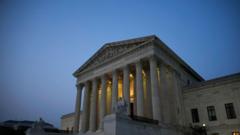Legal debates unfold as the justices weigh the extent of judicial power over presidential decisions, setting the stage for potential shifts in citizenship rights.
### Supreme Court Considers Trump's Challenge to Birthright Citizenship

### Supreme Court Considers Trump's Challenge to Birthright Citizenship
The US Supreme Court reviews President Trump's efforts to eliminate birthright citizenship, a pivotal case impacting immigration policies.
In a landmark session held on Thursday, the US Supreme Court began deliberating President Donald Trump's controversial initiative aimed at terminating birthright citizenship—a legal principle that grants citizenship to anyone born on US soil. This high-stakes case addresses whether lower courts possess the authority to block presidential directives that apply nationally, following instances where judges have halted Trump's executive orders.
During the two-hour hearing, arguments from both sides revealed deep ideological divides among the justices. The US solicitor general contended that lower courts have exceeded their jurisdiction, while representatives from several states argued that endorsing Trump's stance could lead to chaos and inconsistency in citizenship laws.
“The ramifications of disrupting established legal norms would be profound,” stated Jeremy Feigenbaum, New Jersey's solicitor general, who warned that a ruling in favor of Trump could create a fragmented citizenship landscape across state lines. He emphasized that such a shift could severely affect access to essential services and lead to inequities in immigration enforcement.
The discussions provided a glimpse into ongoing concerns regarding the balance of power between the presidency and judicial system. Several justices highlighted the potential pitfalls of allowing unilateral executive authority, with liberal Justice Elena Kagan questioning the rationale behind bringing the case to the court given past lower court defeats.
For its part, the Trump administration maintains that current legal practices lead to inefficient judicial outcomes and has proposed alternatives like class-action lawsuits. Nonetheless, critics caution that these suggestions would be unwieldy in urgent situations.
Outside the court, protests erupted as demonstrators, including former House Speaker Nancy Pelosi, rallied against Trump's immigration policies, echoing sentiments of constitutional rights advocates. “This is about citizenship, and we must uphold our fundamental values of due process,” she declared.
This Supreme Court case arises from three distinct lawsuits that question Trump's authority to change longstanding citizenship norms rooted in the 14th Amendment. Legal scholars widely agree that the President lacks the power to unilaterally alter this constitutional guarantee; if Trump prevails, he may be empowered to further utilize executive orders without extensive congressional approval.
Legal excitement mounts as the justices grapple with the broader implications of their eventual ruling, including the fate of thousands of US-born children who could face second-class citizenship or statelessness under a shift in policy. The decision remains uncertain, with no timeline established for when it may be issued, leaving many watchful of the court's future stance on this pivotal issue.






















